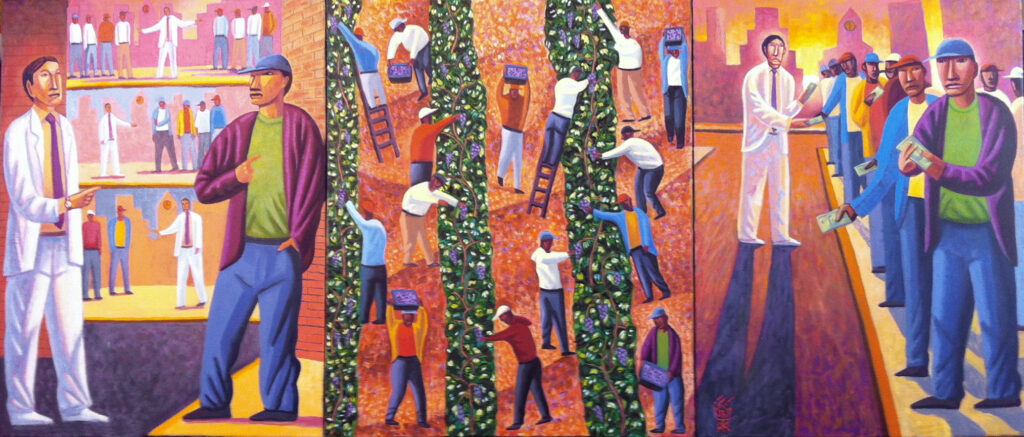Gr-r-r–there go, my heart’s abhorrence!
Water your damned flower-pots, do!
If hate killed men, Brother Lawrence,
God’s blood, would not mine kill you!
Thus begins Robert Browning’s Soliloquy of the Spanish Cloister, a hilarious glimpse into the thoughts of a monk beset by envy. The best part of these first words isn’t a word at all but a sound: Gr-r-r. That gets quickly to the nature of envy. It prompts its victims to look at perceived competitors and growl inhumanly. Grrrrrr. . .
Are you envious because I am generous? The landowner’s question at the end of today’s parable addresses the vice of envy. The parable itself makes us squirm because we are inclined to agree with the villains of the story, with those who worked the full day but get paid only as much as those who worked a small part. Of course, the parable is not meant to be a lesson on social justice or fair labor practices. It’s an absurd story that highlights God’s generosity; that he admits to heaven even those who arrive at the last minute; that Divine Mercy is beyond the calculations of human justice.
More importantly (and more painfully), the parable calls attention to our envy, to our resentment that others have something we don’t think they should have. After that guttural Grrr, the envious man inevitably says, “It’s not fair!” By which he means that it’s unfair according to his reckoning. More to the point, he judges what God has done as unfair. God has been unjust. His generosity and goodness need to be reconfigured according to man’s standards. So, envy is more than disappointment that someone has more. It is a claim of injustice; that God has erred in his apportioning of gifts.
By a strict accounting of things – with the mindset of only justice and never liberality or mercy – it isn’t fair. God distributes his gifts in uneven and curious ways. It’s a mystery of his providence why some have more, and others have less. But we should approach that reality as an invitation and opportunity to rejoice and participate in God’s generosity – even if it doesn’t match our calculations. After all, God knows what he is about.
But the envious man thinks that he knows better. And in so doing he’s following someone else’s lead. Because it wasn’t a man who first envied. It was Satan: “Through the devil’s envy death entered the world, and those who belong to his party experience it.” (Wisdom 2:24) The devil was the first to find fault with God’s goodness. As a result, he looks enviously at us, the beneficiaries he deems unworthy.
And, because misery loves company, the devil seeks to make us participants in his fault. With that death enters the world again and again. Whenever we give in to envy, the devil is at our elbow in an instant, recognizing in us a kindred spirit and goading us into deeper envy.

Thus, we find envy woven throughout our history. The serpent makes Adam and Eve into “those who belong to his party” by inducing them to envy and leading them into competition with God: “Did God really say, ‘You shall not eat from any of the trees in the garden’?” (Genesis 3:1) Out of envy, Cain rises against Abel, Joseph’s brothers sell him into slavery, the Jews seek our Lord’s death and that of the Apostles and of Saints Paul, Barnabas, and Silas (cf. Mark 15:10; Acts 5:17; 14:45; 17:5).
Are you envious because I am generous? Another translation brings us deeper into the issue: Is thy eye evil, because I am good? The word envy comes from the Latin invidere – to look sideways or askance at someone. Envy is that sideways glare that judges and begrudges the other person’s blessings.
It’s ultimately a matter of sight – of how we look at things, of whether we see the world in terms of God’s generosity or our rights, of gift or entitlement. At the core of the diabolical sin is a view of reality as constant rivalry and conflict. So, Uncle Screwtape says, “To be means To be in competition.” Either we will see the gifts bestowed on others as an invitation to rejoice and participate in God’s generosity. Or we will look askance at those unworthy recipients and sit as judges of divine providence.
Thus, the aphorism, “Comparison is the thief of joy.” The problem of the day laborers — of the Pharisees and of us — is to see the world in terms of comparison. It’s not only the mistake of thinking that, if God gives more to others, he necessarily gives less to us. It’s also, and more deeply, the grave error of finding our worth and joy in how we compare to others.
That’s a debilitating and exhausting habit, requiring the constant monitoring of others lest we lose our value by someone else’s blessedness. Entering that comparison game is getting on the treadmill of looking, watching, eyeing others — instead of looking to the Lord.
Are you envious because I am generous? Our answer should be a spirited, No! I rejoice in your generosity. . .even when I don’t understand or even agree with it. The demons begrudge God his generosity and thus deprive themselves of it more and more. May we be like the angels, rejoicing in God’s generosity and thus becoming greater participants in it — and recipients of it.
__________















